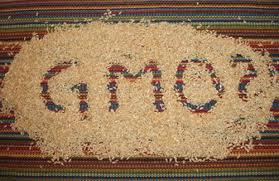If you’ve been following the GMO labeling movement over the years, you’re probably already aware of how confusing and complicated the process has become. What started as a simple declaration of consumers’ “right to know” which products contain GMO’s has devolved into a game of deception, back-stabbing, and political maneuvering.
On July 1, Vermont’s groundbreaking GMO labeling law officially went into effect. The state’s legislation was a major victory—it survived a full two years of scare tactics, law suits, and political posturing, and is the first law in the United States to require mandatory labeling of all food products that contain genetically modified ingredients.
For a moment, it seemed that the Vermont law could stand as a model for the rest of our nation. The past failures of the anti-GMO movement made it seem like real legislation was a pipe dream, but Vermont restored supporters’ hopes that individual state legislation may be a viable way forward.
But yes…there’s bad news. Unfortunately, it seems that the fight for GMO labeling (as obvious and commonsensical as its demands may seem) is far from over—Vermont’s labeling law is about to be overturned!
On July 7, the Senate passed a national GMO labeling bill that preempts Vermont’s new law. The bill is expected to pass fairly easily in the House of Representatives…and many GMO opponents and grassroots organizations believe it to be a huge setback for the GMO labeling movement.
The real story behind the new “National” GMO Labeling Bill
Right as the Vermont bill was officially taking effect, Senators Pat Roberts and Debbie Stabenow doubled their efforts to push a national GMO labeling bill that’s been in the works for some time. This might seem like more good news, but sadly, the story is much more complicated.
The dominant interpretation in the alternative health community is that the bill is bogus. Opponents argue that it’s a pro-GMO bill masquerading as anti-GMO progress, because of its admittedly wishy-washy and suspicious contents.
Here’s some reasons why everyone is worried about this bill…
- Its labeling “requirements” exclude a large percentage of GMO products (including meat and dairy). The Consumers Union even claims that it could exclude a huge number of processed foods, as well as any product with meat as the main ingredient.[1]
- It bans state-legislated GMO labeling laws (meaning that it would nullify Vermont’s bill).
- It will delay any GMO labeling for two years (or more), in order to give the USDA time to determine labeling parameters (and would allow the USDA to decide what percentage of GMO ingredients in a product warrants GMO labeling).
- It will allow manufacturers to use only QR codes (which need to be scanned by a cell phone or other suitable device) instead of readable labels.
- The poorly written language of the bill nearly ensures that its labeling requirements will be unenforceable (some opponents to the bill even claim that many of its requirements are listed as “optional”).
Whole Foods co-CEO Walter Robb supports the proposed bill, and thus “America’s Heathiest Grocery Store” has become the center of vicious criticism.
Whole Foods co-CEO Walter Robb supports the proposed bill, and thus “America’s Healthiest Grocery Store” has become the center of vicious criticism. The company has been accused of selling out to Monsanto, and to telling outright lies about its involvement in the situation surrounding the Stabenow-Roberts bill.
So is Whole Foods engaging in a vast and lucrative conspiracy against American consumers? Does the company secretly want to kill the GMO labeling movement?
The fact of the matter is that a bipartisan bill, particularly one focusing on a hotly contested topic like GMO labeling, is an incredibly difficult thing to come by. For this reason, Walter Robb called this new bill reached by the senators an “incredible thing.”[2]
In a video posted by The Aspen Institute, Whole Foods CEO, Walter Robb makes it clear that he believes the bill to be an imperfect but necessary step toward national GMO labeling. He acknowledges the Vermont labeling bill as a driver of momentum toward national labeling, and claims that Whole Foods will stick to its own internal commitment to achieving 100% labeling transparency by 2018 (regardless of what legislation ends up calling for).
While it’s unfair to assume automatically that Whole Foods is willfully allying itself with Monsanto, it’s worth noting that The Aspen Institute produced a related video called “The Next Food Revolution,” which happens to be openly funded by Monsanto.
The video featuring Walter Robb has been cited as “proof” that Whole Foods is in bed with Monsanto, but watch it and decide for yourself—it could just as easily be the case that Walter Robb simply wants to support whatever watered-down version of national GMO labeling he believes is possible at the moment.
All of this is not meant to exonerate Whole Foods and the other companies that support the Stabenow-Roberts bill, but only to point out that their misguided support might not be fueled by malicious intent. Conspiracy theories always seem exciting, but the truth is usually more complicated.
The real test will come in 2018, when we see whether Whole Foods follows through with its promise of “100% transparency.”
The way forward
Regardless of whether or not you decide to boycott Whole Foods for its decision, one thing is clear: For all the reasons listed above, supporting the Stabenow-Roberts bill is not the right choice. Overturning the clear and straightforward Vermont labeling law (and removing any possibility of future legislation in other states) in favor of convoluted, ineffectual national “labeling” is a grave mistake.
Walter Robb and other supporters of the bill claim that state legislation that follows in the footsteps of Vermont will only make it difficult for manufacturers to comply with varying standards across the country. This seems very unlikely, though, given how simple and direct the language of the Vermont bill is—and assuming that the loophole-filled, non-committal language of the Stabenow-Roberts bill will better serve GMO labeling interests is an awfully big gamble.
If you believe in the Vermont labeling bill and want it to continue to see the light of day, sign this Food Democracy Now petition called  “Stop Monsanto’s secret plan to Kill GMO labeling”
“Stop Monsanto’s secret plan to Kill GMO labeling”
And meanwhile, keep your eye on the prize: don’t let all the finger-pointing and propaganda distract you from basic best practices when it comes to GMO’s. Support the GMO labeling movement in any way that you can, but don’t count on regulatory bodies to protect you—take responsibility for your own health by avoiding conventional produce, meat, and dairy, as well as processed foods (you don’t need a label to tell you that these products contain genetically modified ingredients).
References
[1] http://consumersunion.org/research/consumers-union-letter-to-us-senate-in-opposition-of-s-764-to-preempt-state-gmo-labeling-laws/
[2] http://www.naturalnews.com/054515_Whole_Foods_GMO_labeling_bill_Walter_Robb.html






